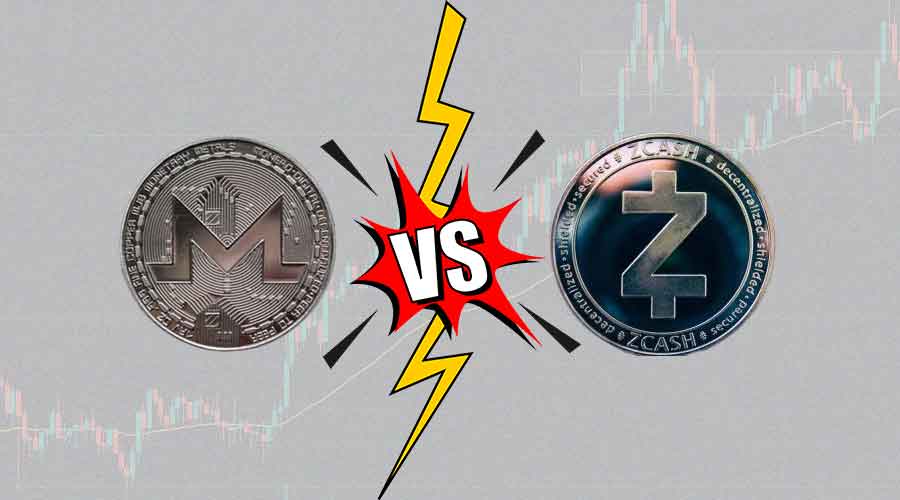 “Deciphering Privacy: Monero (XMR) vs. Zcash (ZEC) – A Cryptocurrency Privacy Coin Face-Off”
“Deciphering Privacy: Monero (XMR) vs. Zcash (ZEC) – A Cryptocurrency Privacy Coin Face-Off”
Introduction
In the realm of cryptocurrencies, privacy has become a topic of paramount importance. As blockchain technology and digital currencies continue to gain traction, so does the need for privacy-focused coins that enable users to conduct transactions without revealing sensitive information. Two standout contenders in this space are Monero (XMR) and Zcash (ZEC). These privacy coins offer advanced cryptographic techniques to ensure the confidentiality of transactions and user identities. In this article, we will delve into the Monero vs. Zcash showdown, exploring their unique features, use cases, and the ongoing debate over which one reigns supreme in the realm of privacy-focused cryptocurrencies.
Monero (XMR): The Untraceable Currency
Monero, often referred to as “XMR,” is a privacy-centric cryptocurrency that prides itself on providing untraceable transactions. Monero achieves this through advanced cryptographic techniques, including ring signatures, stealth addresses, and confidential transactions.
Ring Signatures: One of Monero’s key features is ring signatures, which blend a user’s transaction with those of other participants. This makes it nearly impossible to determine the true source of a transaction, providing a high level of privacy.
Stealth Addresses: Monero employs stealth addresses to obscure the recipient’s identity. When a user receives XMR, the transaction generates a one-time address that cannot be linked to the recipient’s wallet.
Confidential Transactions: This feature hides the transaction amount, ensuring that outside observers cannot determine the value of XMR being transferred.
Zcash (ZEC): Privacy with a Choice
Zcash, represented as “ZEC,” offers a unique approach to privacy by providing users with the option to make either transparent or shielded transactions. This flexibility distinguishes Zcash in the world of privacy coins.
Transparent Transactions: Similar to Bitcoin, transparent transactions on the Zcash blockchain are visible to all participants, and the sender, receiver, and transaction amount are publicly recorded.
Shielded Transactions: Zcash’s privacy feature comes into play with shielded transactions. Users can choose to send ZEC through a shielded pool, which leverages zero-knowledge proofs (zk-SNARKs) to encrypt transaction information. This ensures that sender, receiver, and transaction value remain confidential.
Zcash’s unique approach to privacy has garnered attention from a wide range of users. Some may prefer transparent transactions for certain use cases, while others opt for complete privacy with shielded transactions. ZEC is used in various applications, including as a privacy-focused alternative to Bitcoin.
Monero vs. Zcash: A Privacy Coin Showdown
The battle between Monero and Zcash revolves around several key aspects:
Privacy Technology: Monero relies on ring signatures, stealth addresses, and confidential transactions to provide robust privacy. Zcash, on the other hand, uses zk-SNARKs for its shielded transactions, offering strong privacy features. Both approaches are highly effective, making it challenging to declare a clear winner in this regard.
Fungibility: Fungibility refers to the interchangeability of tokens. Monero’s privacy features ensure that all XMR coins are identical, as they cannot be traced back to specific transactions. In Zcash, the fungibility of transparent and shielded coins differs. Transparent coins are more traceable than shielded ones, potentially affecting fungibility.
Community and Development: Both Monero and Zcash have active and dedicated communities, each pushing for the advancement of privacy technologies. Monero’s open-source development and community-driven approach have contributed to its strong reputation. Zcash’s development includes a public benefit company, the Electric Coin Company (ECC), which has actively supported the project.
Regulatory Concerns: Privacy coins have faced scrutiny from regulators concerned about their potential use in illegal activities. Zcash has made efforts to comply with regulatory requirements, offering the choice of transparent transactions. Monero, with its untraceable transactions, faces a different set of challenges in this regard.
The Verdict?
The question of which privacy coin is superior ultimately depends on individual preferences and specific use cases. Monero excels in providing strong privacy by default, making it an ideal choice for users seeking the highest level of anonymity in their transactions. Zcash, with its flexibility between transparent and shielded transactions, offers a unique choice for those who value both privacy and transparency in different scenarios.
In essence, Monero and Zcash are two of the most prominent privacy-focused cryptocurrencies, and their coexistence serves to meet the diverse needs of users in the crypto space. Privacy-focused cryptocurrencies will continue to evolve in response to changing regulatory landscapes and user demands, making it an exciting space to watch.




